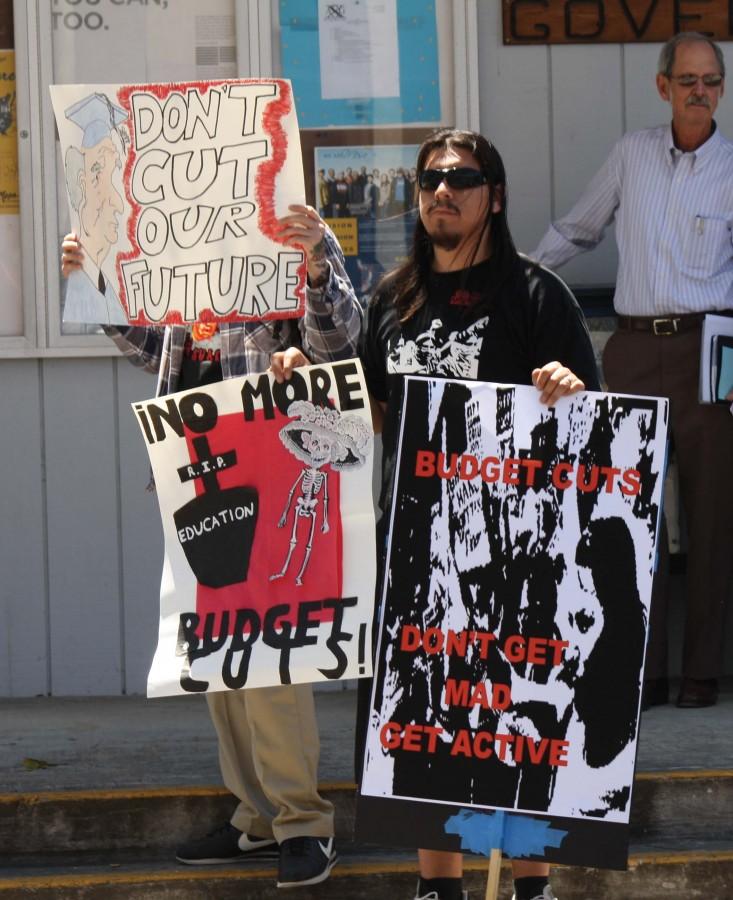A mosaic of speakers urged about 500 spectators to join in protest against budget cuts at a two-hour rally at Mesa on April 27.
“The time has come for us to join the fight. To stop the mutilation and the raping of our education,” said President of M.E.Ch.A. Miguel Murillo, 24, majoring in women’s studies.
The mutilation Murillo spoke of is the simultaneous increase in the fees to attend community colleges and the near elimination of the summer intersession. This has been caused by the extensive cuts made by Gov. Jerry Brown and the state legislature.
“These are the most extreme cuts I’ve ever seen in California in my entire career,” said SDCCD Chancellor Constance Carroll who has worked in higher education for over thirty years.
These massive cuts to education, $1billion to the UC/Cal State system, $10 million to the SDCCD and $3.3 million to Mesa College alone, are part of an even larger $12.5 billion cut to state services such as Medicaid, libraries and state parks. Brown proposes an additional $12 billion of revenue savings with the five-year extension current of tax hikes.
“The bad news is that this (budget cuts) can become twice as bad if the legislature does not agree with the governors second half of the plan,” warned Carroll.
Not a single Republican in the California State Legislature voted to even put the tax extension son the ballot for the citizens to decide whether they were willing to pay for the budget shortfall without further cuts. A mere two Republican votes would give the measure the two-thirds vote necessary to increase revenue through taxation.
“Why is it okay for the legislature to increase taxes on students by raising their fees but they don’t want to increase taxes on the wealthiest Americans?” asked John Mahler, President of American Federation of Teachers Guild for San Diego Community Colleges.
According to Mahler the 40 percent increase in student fees equates to a poverty tax. He stated that the Bush-era tax cuts saved California’s top 1 percent over $9 billion and questioned why California is the only gas and oil producing state not to have a severance tax on the extraction of gas and oil. Mahler believes these combined taxes would easily fill the budget gap we have today.
“George Bush’s Texas, Dick Cheney’s Wyoming, Sarah Palin’s Alaska – they all tax oil and gas severance. California does not,” Mahler said.
One reason for the difficulty California has with taxing corporations and the wealthy elite is because, although the state is predominantly Democratic, Proposition 13, passed in 1978, allows a Republican minority of one-third to hold the Democrats’ legislative powers hostage.
“Maybe those people who make over $300 thousand a year should pay a little more like they did back in the fifties, sixties and seventies,” Jose Rodriquez, a student member of Bringing Education and Activism Together, said.
Chemistry Professor Rob Fremland told students that, unlike the wealthy, the unions, and many other voting groups, students do not have anyone that politically speaks for them.
“They (legislators) are not caring about students, they’re not caring about you and they’re not caring about your success and your future,” said Mahler.
Mahler invited attendees to join in a demonstration to take place at the office of Republican State Assembly Member Nathan Fletcher, one of five Republican representatives in San Diego who refuse to cooperate with Brown’s tax extensions, on May 13.
A lack of representation and the apparent political disinterest of students, more exactly people 18 – 24 years old, allow politicians an opportunity to legislate against their interests with little to no resistance.
“Now we’re supposed to care, because now this is hurting us. Let’s make them understand that we care,” Rodriguez pleaded.
Students in attendance took the first step by writing letters to stat legislatures. The pages will be combined into a single document, published and sent to lawmakers.



